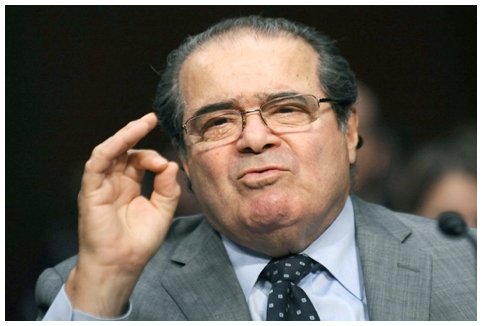CommentsAT LENGTH-Antonin Scalia wasn’t dead for more than 24 hours before the political rancor in Washington D.C. started up in the press. Of course, there were praises from both conservatives and liberals regarding his 30 years of service on the U.S. Supreme Court. Scalia was described as the intellectual anchor of the conservative court majority, which subscribes to an originalist and textualist view of the U.S. Constitution. He and Justice Anthony Kennedy are also the last of President Ronald Reagan’s legacy appointments to the Supreme Court.
The political uproar was launched initially by U.S. Senate majority leader Mitch McConnell (R, KY), challenging whether President Barack Obama should rightly appoint a replacement justice to the court before he is termed out of office 11 months from now -- essentially a lame duck nomination by the president.
McConnell and the rest of the Republican Party are just aghast that Obama will exercise his constitutional duty and send to the Senate a judicial nominee that could turn the 5-4 conservative majority into a more liberal one -- a majority that could continue for the next three decades.
“The American people should have a voice in the selection of their next Supreme Court Justice,” said McConnell in a released statement. “Therefore, this vacancy should not be filled until we have a new president.”
I doubt that Scalia would support such an objection from beyond the grave.
You see, Scalia’s mark on the law comes from his originalist interpretation of the U.S. Constitution, which basically argues that the meaning of the Constitution and its amendments are and should remain fixed and unchanging over time.
This interpretation is contrary to the school of thought that the Constitution is a “living” document that evolves over time.
Textualism on the other hand is a theory of the interpretation of law, holding that a legal text’s ordinary meaning should govern its interpretation, as opposed to inquiries into non-textual sources such as the intention of the legislature in passing the law.
Justice Oliver Wendell Holmes Jr. (March 8, 1841-March 6, 1935,) although not a textualist himself, well-captured the philosophy, when he said:
We ask, not what this man meant, but what those words would mean in the mouth of a normal speaker of English, using them in the circumstances in which they were used… We do not inquire what the legislature meant; we ask only what the statutes mean.
In other words, make sure that what is written means what you think it means and don’t expect anyone to understand your intention for writing a law unless it’s clearly in the law.
However, I’m drifting off my main point here trying to explain the peculiarity of Scalia’s legal position. He probably would have argued that Obama has the absolute right and duty to nominate his replacement on the Supreme Court, as written in the Constitution, and that the U.S. Senate has the right to review and confirm it.
So let the battle begin.
Why any of this matters and what the death of Scalia really means comes at the end of Reagan’s legacy -- a legacy that began when he was California’s governor during the Vietnam War and college campuses were erupting in protests and uprisings.
Reagan’s influence stretches from the crackdown on University of California demonstrations to the Iran-Contra scandal to the trickle-down economics theory, to his wife Nancy’s popular, if not delusional, “Just Say No to Drugs” campaign. All have had a lasting negative effect over the past 30 to 40 years.
To this day, we still can’t say that the war on drugs is over, or who won.
Some argue, and I agree, that Reagan was one of least prepared persons to sit in the Oval Office over the course of the last 100 years and to some extent we’re still paying for it.
Conservatives like to defend Reagan as a model of fiscal conservatism: he is clearly one of the leaders of debt creation in terms of total increase in “federal debt to GDP.” Looking at U.S. presidents in the post-World War II era, Republican presidents during terms have contributed far more to the debt load of the nation than Democrats.
Presidents Gerald Ford, Ronald Reagan, George H.W. Bush, and George W. Bush all added to the federal debt significantly on a percent-of-GDP basis.
On the Democratic side, only Obama -- who inherited the worst financial crisis in this era from his predecessor -- also ranks high in terms of contributing to the federal debt.
Antonin Scalia’s death -- as he was a significant actor in the Reagan era -- turns the page to a new chapter of American politics. It is one that pivots away from the Cold War politics and conservatism of my parents’ generation to one in which someone like Bernie Sanders, an avowed democratic-socialist, might actually have a shot at the Oval Office without people crying out that “the sky is falling.”
America has changed culturally since the time Reagan was in office and we are only now beginning to realize what this means politically.
(James Preston Allen is the Publisher of Random Lengths News, the Los Angeles Harbor Area's only independent newspaper. He is also a guest columnist for the California Courts Monitor and is the author of "Silence Is Not Democracy - Don't listen to that man with the white cap - he might say something that you agree with!" He was elected to the presidency of the Central San Pedro Neighborhood Council in 2014 and has been engaged in the civic affairs of CD 15 for more than 35 years. More of Allen … and other views and news at: randomlengthsnews.com ) Prepped for CityWatch by Linda Abrams.
Sidebar
Our mission is to promote and facilitate civic engagement and neighborhood empowerment, and to hold area government and its politicians accountable.

 CityWatch Los Angeles
Politics. Perspective. Participation.
CityWatch Los Angeles
Politics. Perspective. Participation.
03
Tue, Feb















